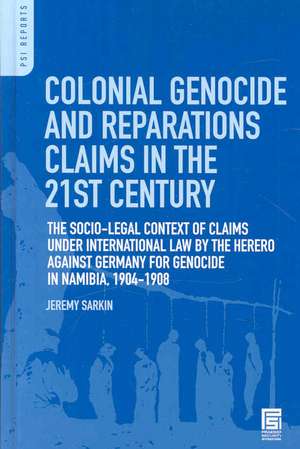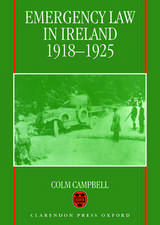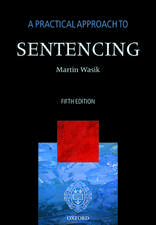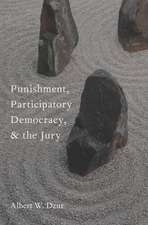Colonial Genocide and Reparations Claims in the 21st Century: The Socio-Legal Context of Claims under International Law by the Herero against Germany for Genocide in Namibia, 1904-1908: PSI Reports
Autor Jeremy Sarkinen Limba Engleză Hardback – 29 noi 2008 – vârsta până la 17 ani
Din seria PSI Reports
- 35%
 Preț: 414.13 lei
Preț: 414.13 lei - 28%
 Preț: 412.88 lei
Preț: 412.88 lei - 28%
 Preț: 361.86 lei
Preț: 361.86 lei - 27%
 Preț: 376.91 lei
Preț: 376.91 lei - 28%
 Preț: 437.31 lei
Preț: 437.31 lei - 24%
 Preț: 412.88 lei
Preț: 412.88 lei - 28%
 Preț: 412.61 lei
Preț: 412.61 lei - 27%
 Preț: 376.58 lei
Preț: 376.58 lei - 27%
 Preț: 376.43 lei
Preț: 376.43 lei - 28%
 Preț: 438.17 lei
Preț: 438.17 lei - 27%
 Preț: 378.09 lei
Preț: 378.09 lei - 28%
 Preț: 437.75 lei
Preț: 437.75 lei - 24%
 Preț: 459.91 lei
Preț: 459.91 lei - 28%
 Preț: 459.91 lei
Preț: 459.91 lei - 28%
 Preț: 412.79 lei
Preț: 412.79 lei - 24%
 Preț: 459.51 lei
Preț: 459.51 lei - 28%
 Preț: 435.55 lei
Preț: 435.55 lei - 28%
 Preț: 375.66 lei
Preț: 375.66 lei - 24%
 Preț: 462.45 lei
Preț: 462.45 lei - 27%
 Preț: 360.03 lei
Preț: 360.03 lei - 14%
 Preț: 333.24 lei
Preț: 333.24 lei - 28%
 Preț: 437.40 lei
Preț: 437.40 lei - 27%
 Preț: 370.30 lei
Preț: 370.30 lei - 24%
 Preț: 462.45 lei
Preț: 462.45 lei - 27%
 Preț: 379.88 lei
Preț: 379.88 lei - 18%
 Preț: 322.02 lei
Preț: 322.02 lei - 18%
 Preț: 335.62 lei
Preț: 335.62 lei - 14%
 Preț: 337.61 lei
Preț: 337.61 lei - 27%
 Preț: 339.36 lei
Preț: 339.36 lei - 26%
 Preț: 348.26 lei
Preț: 348.26 lei
Preț: 463.72 lei
Preț vechi: 610.14 lei
-24% Nou
Puncte Express: 696
Preț estimativ în valută:
88.75€ • 95.80$ • 74.42£
88.75€ • 95.80$ • 74.42£
Carte tipărită la comandă
Livrare economică 18 aprilie-02 mai
Preluare comenzi: 021 569.72.76
Specificații
ISBN-13: 9780313362569
ISBN-10: 0313362564
Pagini: 320
Dimensiuni: 156 x 235 x 28 mm
Greutate: 0.61 kg
Editura: Bloomsbury Publishing
Colecția Praeger
Seria PSI Reports
Locul publicării:New York, United States
ISBN-10: 0313362564
Pagini: 320
Dimensiuni: 156 x 235 x 28 mm
Greutate: 0.61 kg
Editura: Bloomsbury Publishing
Colecția Praeger
Seria PSI Reports
Locul publicării:New York, United States
Notă biografică
Jeremy Sarkin is Visiting Professor of Human Rights at the Fletcher School at Tufts University and Senior Professor of Law at the University of the Western Cape in Cape Town, South Africa. He is Special Rapporteur for Enforced and Involuntary Disappearances to the United Nations Human Rights Council. He served as an acting judge in the Cape High Court in South Africa. He is Legal Advisor to the Paramount Chief of the Herero people in Nambia. He has published over 100 articles and 12 books, including Human Rights in African Prisons (2008), Reconciliation in Divided Societies: Finding Common Ground (2007), Carrots and Sticks: The Truth and Reconciliation Commission and the South African Amnesty Process (2004), and Human Rights, The Citizen, and the State: South African and Irish Perspectives (2002).
Cuprins
Introduction1. THE LEGACY OF THE HERERO GENOCIDE ON NAMIBIA TODAY2. THE HISTORICAL AND CURRENT LEGAL IMPLICATIONS OF GERMANYS CONDUCT3. THE DEVELOPING NORM OF REPARATIONS AND APOLOGIES FOR HISTORICAL CLAIMS: PAST, PRESENT AND FUTURECONCLUSION
Recenzii
Colonial Genocide is a welcome and timely contribution to the literature on the Herero experience under German Colonial and more generally to the discourse on redress and reparations for historical crimes. As the author rightly notes, the plethora of research on the genocides of Europe over the last century would indicate that European genocide is thought more worthy of study than genocide in other, less developed, regions of the world. In this book, Sarkin broadens the debate, effectively locating the Herero atrocities within the broader context of the developing norms on genocide and reparations.












